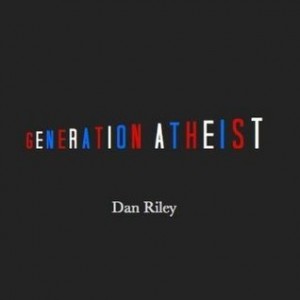Book Review: Generation Atheist by Dan Riley

With his book “Generation Atheist,” Dan Riley starts to fill a large gap in atheist literature. While many books give the logic, history or the philosophy of atheism and humanism, personal stories, so prevalent in Christian literature, have been sparser. But here is a collection of 25 first-person stories of “conversion narratives” to atheism by people in their 20’s and 30’s, stories well told and edited.
Riley presents the reader with a solid mix of backgrounds and pathways to atheism. The storytellers include former Mormons, Roman Catholics, Evangelicals, a few liberal Protestants, as well as Jewish, Muslim and Hindu backgrounds. Within these backgrounds, the level of religiosity is also well covered, with some being raised in strict, religious households, and others having more “cultural religious” upbringings.
A few stories tell of conversion to atheism as an escape from the harsh upbringing of strict religion. These are the most dramatic stories and are well told, but many others describe the church community they were raised in as welcoming, loving, and supportive of them in many ways (short of their atheism). In these stories the hardest part of the conversion to atheism is the loss of that community. Many of these younger atheists do not end up stridently anti-religious and advocate for a much more accommodating “live and let live” stance with religion.
It is sobering just how many of these people were raised in regions where religion was simply part of the atmosphere, so pervasive as to be unquestioned. Simply leaving that atmosphere behind was a key turning point for some. One word that jumped out at me, and which I plan to use extensively from here on, is taken from Jon Nelson, who talks of going from Kansas to Boston University and realizing that, unlike in Kansas, most people in New England were not theists or even the rare atheist but “apatheists”—they didn’t care one way or the other. For someone who came from a state where religion filled the air, this apathy is in itself liberating.
Another common theme through the stories for many of this age group, the initial questioning of their beliefs led them quickly onto the Internet. YouTube videos of Richard Dawkins, Carl Sagan, and other prominent atheists debating and explaining the position of atheism were crucial to many of the conversions told of in this collection. Just knowing that there were people out there thinking like them, and supporting that thinking with intelligent debate and evidence, gave them the courage they needed to follow their own thoughts. Also prominently mentioned are the books of the “new atheists” particularly Dawkins’ “The God Delusion” and Sam Harris’ “The End of Faith.”
It is comforting that, with a few notable exceptions, most of the parents in these conversion stories continued to provide love and support for their children even when they disagreed with their son or daughter’s views. A few even followed their kids into atheism. Even more instructional is how many who become open atheists quickly had friends and acquaintances follow them. Throughout the stories one gets the sense that the most powerful tool to get people proclaiming atheism is simply by knowing that there are other people they know and respect who also espouse it.
The stories told in this book provide a welcome look at how everyday people went from religion to atheism. Riley is a skillful editor, and does excellent work arranging the stories told. He lets people tell their own stories and the individual voices come through. They are the type of powerful stories that need to be told more often, and they provide meaningful examples of how the honesty of atheism can change one’s life for the better.
